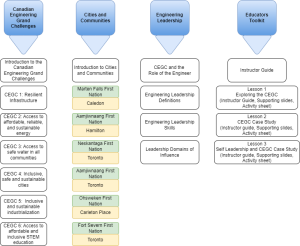Course Structure
The course is structured in a step by step approach by first taking a learning journey across the Canadian Engineering Grand Challenges, then studying examples of these challenges in Ontario cities and communities, and followed by integrating leadership skills to understand and address the grand challenges. The course also includes a toolkit for educators that provides guidance on navigating the course material to enable educators to reuse the materials for the CEGC, cities and communities, and leadership skills in a meaningful manner. Each module is available in English and French.
The course is structured in three content modules and a toolkit for educators as follows:
Module 1 – Canadian Engineering Grand Challenges
The “Canadian Engineering Grand Challenges” module contains material that summarizes the six Canadian Engineering Grand Challenges. For each grand challenge, the teaching material includes the connection to the United Nations Sustainable Development Goals, defining what the challenge entails, high level overview of the grand challenge, status of the challenge globally, status of the challenge in Canada, roadblocks to success, and strategies to meet 2030 targets.
Module 2 – Cities and Communities
The Cities and Communities module contains material that showcases examples of the Canadian Engineering Grand Challenges in cities and communities, specifically Ontario cities and Indigenous communities. These examples serve as case studies and are organized based on their relevance to the Canadian Engineering Grand Challenges as follows:
CEGC 1: Resilient infrastructure: Marten Falls First Nation & Caledon
CEGC 2: Access to affordable, reliable and sustainable energy: Aamjiwnaang First Nation & Hamilton
CEGC 3: Access to safe water in all communities: Neskantaga First Nation & Toronto
CEGC 4: Inclusive, safe, and sustainable cities: Aamjiwnaang First Nation & Toronto
CEGC 5: Inclusive and sustainable industrialization: Ohsweken Six Nations & Carleton Place
CEGC 6: Access to affordable and inclusive STEM education: Fort Severn First Nation & Toronto
Module 3 – Engineering Leadership
The Engineering Leadership module provides a framework for to integrate leadership skills to address the Canadian Engineering Grand Challenges. It first presents the role of the engineer in addressing the Canadian Engineering Grand Challenges, and positions engineering as a sociotechnical profession. The module then presents engineering leadership definitions and provides an understanding of engineering leadership skills by distinguishing them from management skills. The module concludes with leadership domains of influence that are structured as self-leadership, team leadership, organizational leadership, and societal leadership, including examples of roles and skills for each domain.
Toolkit for Educators
The Toolkit for Educators contains resources for instructors and their learners. The information and activities in the toolkit are contextualized to the six Canadian Engineering Grand Challenges (CEGC) in a way that is unique to the engineering context in Canada. The modules and the toolkit for educators are designed to allow instructors to supplement lectures, courses or workshops and complement learning material for their students. For each CEGC, foundational material, activities, case studies and exercises are provided. The modules provide a background to the CEGC themselves and are enhanced by providing a case study that presents a summary of the sociotechnical challenges in cities and communities. The case studies are supported by learning activities to identify problems, address challenges and communicate potential solution ideas. Embedded within this approach are frameworks to build capacity for engineering leadership and sustainability. There is a total of three lessons, each with resources including instructor guides, supporting slides and activity sheets. Lessons vary in duration (15 minutes or 45 minutes) which provide flexibility to the instructor based on the time they are able to commit to this teaching.
The lessons include:
- Lesson 1: Exploring the Canadian Engineering Grand Challenges (15 minutes)
- Lesson 2: Examining CEGC through City and Community Case Studies (15 minutes)
- Lesson 3: Self Leadership – Exploring your Personal Values and Examining your Values in the Context of the CEGC (45 minutes)
The following is a visual representation of the course structure:


